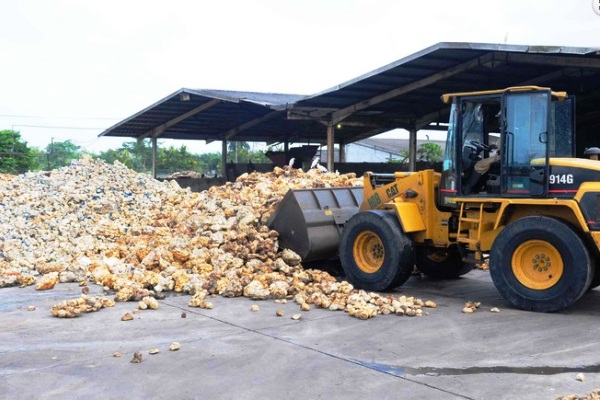Over seven thousand five hundred (7,500) direct and indirect workers of Western region’s biggest rubber factory, Ghana Rubber Estates Limited, risk being rendered jobless as the company is currently considering a possible shutdown over raw materials crisis.
More than 70 thousand persons who receive direct livelihood support from the company’s direct and indirect workers are also at risk.
The company has currently shut down its new rubber processing plant which was commissioned under the 1D1F Initiative in 2020 temporarily due to a lack of raw materials for processing.
All workers have since been asked to stay at home until there are enough raw materials. The company currently operates two factories and has been struggling to get the needed raw materials to feed them.
READ ALSO: 336 bags of smuggled cocoa beans intercepted by district taskforce at Suaman Dadieso
The factories have been shut down a couple of times within the year due to a lack of raw materials. The raw materials unavailability has largely been attributed to the exportation of rubber cup lumps out of the country.
Production supervisor of Ghana Rubber Estate, Samson Boafotey fear the situation might affect the government’s industrialization vision.
“Lack of raw materials to feed our factory has brought a lot of hardships on our workers. This is because they receive some allowances in addition to their monthly salary when we are working but since we do not have the raw materials, they cannot get them. The other factor is that the company took loans for the management of the factory and because of the raw material issues, we are unable to produce. Our machines as they are not working is also a cost to the company. We are urging the government to intervene else we do not know what to do next. The raw material we have in our factory now will last for only two weeks,” he noted.
General Secretary of the General Agriculture Workers Union (GAWU), Edward Kareweh, indicated in an interview with Connect FM that government should be blamed for the development.
He argues that foreigners are now buying a bigger chunk of raw materials from the farmers for export.
“We have always argued that agriculture is the foundation for the development of this country. The economic transformation of this country must start with Agriculture, but today we are faced with the imminent destruction of Agriculture. The capacity of all the rubber producers in Ghana is 100, 000. However, the factories have the capacity to process 140, 000 as a country so what it means is that we can still expand plantations to get more rubber to meet the 140,000. This means we should be importing rubber, but government policy has it that anybody at all can export rubber from Ghana. So, what is happening is that foreigners now go to the farmers to buy the raw materials directly from them and export them in raw form,” he indicated.
He adds that illegal miners have invaded rubber farms, but authorities of government have failed to act.
READ ALSO: Fisheries Ministry targets 200,000 youth in fish farming
“Government must immediately ban the export of the raw materials. We don’t even have enough so why do we export? Over 70, 000 jobs are currently at stake and these people will be left unemployed. The plantation has also been heavily encroached by galamsey activities, and no authority is saying anything,” he indicated.
Currently, there are no laws regulating or stopping the exportation of raw cup lumps out of the country, despite Ghana having the capacity to process all the rubber produced in the country. This calls for urgent steps to be taken by the authorities to regulate the exportation of raw cup lumps as the current practise does not help the country’s goal of becoming an industrialised nation. It also deprives the nation of employment as the value addition process creates more employment and increase the foreign exchange earnings for the country.
By Eric Nana Gyetuah|ConnectFM|Onuaonline.com







